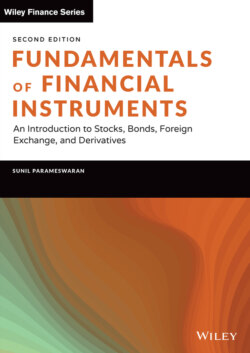Читать книгу Fundamentals of Financial Instruments - Sunil K. Parameswaran - Страница 43
На сайте Литреса книга снята с продажи.
THE NEED FOR BROKERS AND DEALERS
ОглавлениеWhy do we require market intermediaries such as brokers and dealers? The reason is that when investors seek to buy or sell assets in the secondary market, they have to locate a suitable counterparty. Thus, a potential buyer needs to locate a seller and vice versa. Second, not only should a counterparty be available, there should be compatibility in terms of price expectations of the two parties, and the quantity that each of them is seeking to transact. Every trader seeks to trade at a price that is good from their own standpoint. Buyers will therefore be on the lookout for sellers who are willing to offer securities at prices which are less than or equal to what they are willing to pay. Similarly, sellers will seek to locate buyers who are willing to offer a price which is greater than or equal to the price at which they are willing to sell. As we have explained earlier, limit orders are arranged in descending order of the limit price on the buy side and in ascending order of the limit price on the sell side. Thus, buyers are guaranteed access to the lowest prices quoted by sellers while sellers are guaranteed access to the highest prices quoted by buyers. In addition, it is important that the quantity on offer matches the quantity being demanded. Often a large buy or sell order may require more than one trader to take the opposite position before execution.
On an organized exchange it is necessary to go through a broker or a dealer for certain reasons. First, access to the exchange is provided to only registered brokers and dealers. For exchanges that are totally automated, only brokers and dealers will have terminals through which orders can be routed to the central processing system of the exchange. Thus, it is essential for a public trader to go through a licensed market intermediary. Of course, big institutional investors may be provided with order routing systems so that they can seamlessly send orders to the exchange via the intermediary. Similarly, Internet brokers facilitate the access of electronic exchanges by retail clients. On exchanges with floor-based trading, only regular traders will be familiar with the jargon and protocol required for trading. Allowing a novice to step in would cause unnecessary chaos and confusion.
The other reason why exchanges insist on dealing with market intermediaries is to reduce the possibility of settlement failure. The term settlement refers to the delivery of securities from the seller to the buyer and the delivery of cash from the buyer to the seller. Default on the part of either party to a transaction can substantially dent the public's confidence in the system. To prevent settlement failure, exchanges have elaborate risk management systems in place. Market intermediaries are required to post performance guarantees or collateral called margins with the exchanges to rule out the possibility of a failed trade. Obviously, it makes sense for a party to have such a financial relationship with the exchange only if trading regularly and in large volumes. For public traders who trade relatively infrequently, it will not be practical to develop such an arrangement with the exchange. However, brokers and dealers who either trade regularly on their own account and/or have a large number of trades routed through them will find it worth the cost and effort to have such a financial relationship with the exchange.
The brokerage industry has now been deregulated in most countries. Prior to deregulation, a minimum brokerage fee was specified by the authorities. What was therefore happening in practice was that institutional clients were subsidizing retail clients. That is, institutional clients were paying more than they ought to have, considering the magnitude of their transactions, while retail investors were paying less than what they ought to have paid. The immediate impact of deregulation was a sharp increase in retail brokerage rates. However, a brand-new industry was born as a consequence, which is termed as discount brokerage. A regular broker, referred to as a full-service broker, will sit one-on-one with the client seeking to ascertain their investment objectives in order to provide suitable recommendations. The broker will also provide extensive research reports to facilitate decision making. A discount broker, on the other hand, will offer no advice. This broker's only task is to execute orders placed by clients. There is also a category of brokers referred to as deep-discount brokers. These brokers also provide no investment-related advice, but they insist on transactions of a substantial magnitude and charge commissions that are even lower than what are levied by discount brokers.
